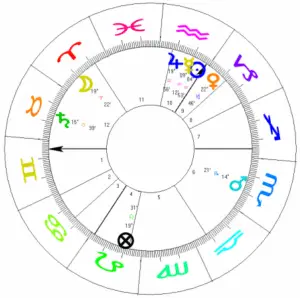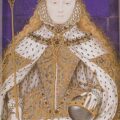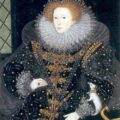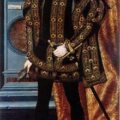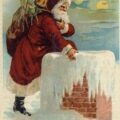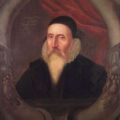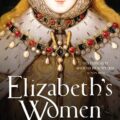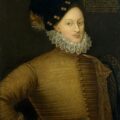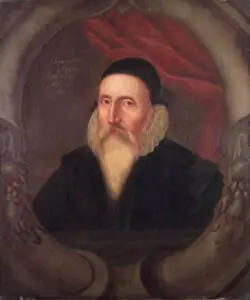
This post has been sparked off by the wonderful novel that I’m reading at the moment – “The Virgin and the Crab: Sketches, Fables and Mysteries from the early life of John Dee and Elizabeth Tudor”. The central character of the book is John Dee, Elizabeth I’s astrologer and great friend, a man whom Elizabeth trusted.
I will do a review on the book as soon as I’ve finished but let me say that the author, Robert Parry, has done a magnificent job at bringing both the era and the characters to life. My body may be on my sofa at home but my mind is in Tudor England with Dee, Cecil, Elizabeth, Dudley, Mary and all the other characters!
Anyway, as I have said John Dee was Elizabeth I’s astrologer and adviser, and in the book he also advises Mary I on her marriage to Philip of Spain, looking at Philip’s chart of nativity and picking an auspicious date for the Royal marriage etc. It may seem strange to us today thinking about Mary I, a strict Catholic, and Elizabeth, a Protestant, seeking advice from an astrologer who was also linked to magic and alchemy – aren’t religion and astrology at opposite ends of the spectrum? Should religious people really consult their “stars” to know their destiny?
Well, some of us may struggle with the idea of religion and astrology being compatible, but in Tudor times things were very different. Tudor people were religious but also incredibly superstitious and believed in magic, witchcraft and curses. In a time where death could be just round the corner and the general public only had a life expectancy of around 35, people wanted to know their destiny, what the future held and although we may take it all with a pinch of salt and just read our horoscope for a laugh, it was all very real for the Tudors.
I was very excited when Elizabeth Files visitor Rochie told me about her website which looks at John Dee, astrology and Elizabeth’s own Nativity and Coronation charts. Rochie has allowed me to reproduce Elizabeth’s chart of nativity here and I have used her site as guidance on reading it – any mistakes are entirely mine!!
Elizabeth I’s Chart of Nativity
The following chart is based on Elizabeth I’s date of birth being the 7th September 1533 and the time of her birth being approximately 3pm. Her time of birth was kept secret so that only royal astrologers and advisers would be able to know her destiny, but it is widely thought that she was born at 3pm.
So, what does this chart say about Elizabeth?
Fortune
An astrologer reading the above chart would see that both the Sun and Jupiter are well placed. The sun signifies royalty and leadership and Jupiter, known as the “Greater Fortune” is lying in Leo, the sign of royalty, signifying that Elizabeth’s fortune lay in royalty. The fact that Jupiter in Elizabeth’s chart is in a perfect “trine” to the “Part of Fortune” adds more strength to its placement with Leo. Elizabeth definitely had a royal future ahead of her!
Love, Strength and Learning
Elizabeth’s chart of nativity shows Venus within its own sign of Libra which is also a strong placement. Venus, the Goddess of Love, represents harmony and proportion and this chart suggests that Elizabeth would be a sensitive person with much good fortune ahead of her.
On the chart, an astrologer like John Dee would also notice the trine aspect between Mars and Mercury. Mars is the planet of warfare, power and strength, and Mercury is the planet of learning and communication. Elizabeth’s chart shows that she would be a passionate speaker, a strong character who knew their mind and a person who was not afraid to voice their ideas. The chart also suggests that Elizabeth would have a strong sense of justice.
Rochie points out that Mars also signifies “father” on Elizabeth’s chart because of its placement as ruler of the 10th House. With Mars being the planet of war and power, it signifies the power and aggression of Elizabeth’s father, Henry VIII.
Partnerships and Marriage
The “Houses” on astrology charts signify what Rochie calls “the more intimate and personal sphere of influence” on a person’s chart and on Elizabeth’s chart Saturn is placed within the 7th House which signifies that Elizabeth would not be expected to have successful relationships and that it was possible that she would not marry. If she did have a relationship, it may be difficult due to a difference in ages or culture or would suffer from setbacks, delays and other such problems.
Saturn is also placed in the sign of Cancer which signifies motherhood and this shows Elizabeth would feel sorrow at losing her mother, Anne Boleyn.
Capricorn Rising
Elizabeth I’s exact time of birth is not known but an afternoon birth in Greenwich, London, on 7th September would mean that Capricorn was Elizabeth’s rising sign and Elizabeth’s physical appearance matches closest to Capricorn, rather than Sagittarius, which would suggest a person with a more rounded figure. Elizabeth was slender and was known for her attractive long fingers. A Capricorn rising sign would also suggest a serious character and although Elizabeth liked fun and flirting she was also a serious person.
The Chart
To an astrologer, Elizabeth’s chart of nativity is a good chart. Rochie writes of how it is a chart that suggests:-
- Good fortune against all odds – Elizabeth went from being an imprisoned princess fearing for her life to being one of the most successful monarchs that England has known.
- A wide range of experiences and interests – Elizabeth I loved learning and books, was a keen horsewoman and enjoyed music and dancing.
- A sensitive and intellectual person – Elizabeth had been a precocious child and as a young woman was fluent in many languages and was accomplished in many different subjects, including mathematics and astronomy. She was also a sensitive person and knew how to “read” people.
- A practical person – Elizabeth was a pragmatist who always made the best out of situations and did what needed to be done.
- An interest in magic and intrigue – Elizabeth I was very interested in John Dee’s work with magic and alchemy.
- A decisive mind – Elizabeth was well-known for procrastinating, but she often used this as a ploy. She generally made very good decisions and stuck to them.
- A thoughtful and meditative person – Elizabeth always thought things through carefully.
- Courage – There’s no doubt that Elizabeth was a courageous person. She had to cope with being imprisoned in the Tower of London, being interrogated and living in fear of her life, yet she stuck to her principles and wouldn’t be bullied. She also showed much courage during her reign, in the face of the threat of Spanish invasions and the plots to remove her from power or kill her.
We can look back on Elizabeth’s chart with the gift of hindsight, but obviously an astrologer had to read the signs that were in the chart. If Elizabeth’s chart truly did show all of the above then it was spot on!
Thanks so much to Rochie for the use of the chart and explanation from her site –http://elizabethsastrologer.ash.com/chart-of-nativity.html.
Further Reading
I am planning on writing more about John Dee and astrology in further posts, but if you want to do research of your own then check out the following:-
Rochie’s squidoo lenses on John Dee and Elizabeth I are also great for us Elizabeth I fans – see http://www.squidoo.com/elizabeth and http://www.squidoo.com/john-dee
Author Robert Parry’s site on John Dee is also a great resource for those wanting to know more about Dee – see http://www.johndee.uku.co.uk/
Robert Parry’s wonderful novel “The Virgin and the Crab: Sketches, Fables and Mysteries from the early life of John Dee and Elizabeth Tudor”
